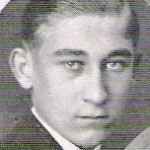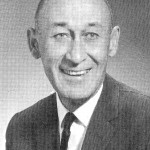 When Larry Quille graduated from Anaheim High in 1930, it’s unlikely that even with his talents as a writer could he have created the story about the amazing life he would live, a tale that included being captured as a Japanese prisoner of war to returning to his alma mater as a teacher with a distinguished 27-year career.
When Larry Quille graduated from Anaheim High in 1930, it’s unlikely that even with his talents as a writer could he have created the story about the amazing life he would live, a tale that included being captured as a Japanese prisoner of war to returning to his alma mater as a teacher with a distinguished 27-year career.
Larry was born on May 12, 1912 in Odessa, Missouri. It was truly Mother’s Day as the modern celebration of Mother’s Day on the second Sunday of May began on May 12, 1912. His family would eventually turn their eyes west and move to California.
Quille, or “Mr. Q” as he was affectionately known by his students, began high school at Riverside High and transferred to AUHS in 1929. During his two years as an Anaheim High student, he was a member of the Printing Club, ’29-’30; the Royal Order of the Golden Drape, an elite drama troupe, ’29; and appeared in the junior play. In his senior year, he served as advertising manager for the “Anoranco” (Anaheim, Orange County) school newspaper. His work on the school newspaper influenced the direction his life would take as he graduated and pursued a career as a journalist.
Larry’s first step toward his career in journalism began at Fullerton District Junior College (now Fullerton College) where he graduated in 1934 with an Associate of Arts degree. He moved to Eugene, Oregon, and continued his education at the University of Oregon, graduating in 1937 with a Bachelor of Science degree.
After graduation, in spite of his young age, he was hired as editor for the struggling La Grande, Oregon newspaper “The Observer.” Larry took over a paper near bankruptcy and turned it into a successful newspaper. This was hard work and took its toll. Friends advised him to take a job as a payroll clerk to improve his health working for Morrison-Knudsen, a Boise, Idaho construction company building facilities on Wake Island. Larry made the fateful decision to take the job. His life would never be the same.
In 1941, a local couple received a letter from Quille, while working on Wake Island. In the letter, dated Nov. 20, 1941, Quille remarked about the Japanese activities in the Pacific. The letter was printed in the “Anoranco” Dec. 18, just five days before the Japanese took Wake Island and Quille became a prisoner of war.
While being a prisoner of war was bad enough, Larry had one experience that could have been very costly. He was directed to heat water for the camp commander to take a bath. Unfortunately, the commander was early and the bath water was not ready. The commander drew his sword and thrust it toward Larry striking him in the arm. The lack of medical attention resulted in the wound becoming infected. He was eventually taken to the hospital where the intent was to amputate the arm. Larry would have no part of it and refused to let the doctors amputate his arm. He would remain in the hospital while trying to heal. One more unfortunate part of the situation was, in Japan, families were responsible for feeding the patients. Larry survived by eating a prior patient’s chrysanthemums and bed sheets. His persistence ensured he would save the arm.
Larry and his fellow POWs were finally liberated on August 23, 1945. He spent a total of 44 months as a prisoner of war. Upon his release, Larry returned to his parents’ home in Fullerton and began work for the Fullerton News Tribune. This would be his last job as a journalist.
Realizing he wanted more, Larry went back to school at Long Beach State in order to complete the courses required to earn his teaching certificate. He completed the requirements in 1952 and was awarded his teaching certificate.
 Larry Quille returned to his alma mater to teach English and journalism. Over his years as a teacher, he recounted his years as a POW to his journalism students, who were tested by writing a report about his account.
Larry Quille returned to his alma mater to teach English and journalism. Over his years as a teacher, he recounted his years as a POW to his journalism students, who were tested by writing a report about his account.
During his 27-year career at Anaheim High, Quille led classes of students who produced award-winning school newspapers and yearbooks. He also was an enthusiastic supporter of Anaheim High athletics and produced numerous game programs and other documentation to further the prestige and history of Anaheim High School.
During his tenure at AHS, Quille produced 24 annuals, 20 of which were rated “high” in Columbia University Scholastic Press Association competition. Eight of the yearbooks won medals in consecutive years, which meant that the books’ quality was in the first category. Six of the annuals were rated 950-plus on a scale of 1000. The 1968 “Colonist,” edited by Diane McIntyre, received 987 points, as did the book of the following year edited by Barbara Loomis.
In 1971, Quille received the Gold Key Award, the highest prize available to high school journalism teachers, given by the Columbia University judges. In 1976, Anaheim High School’s newspaper, the “Anoranco” placed third in the national contest. Editor for the paper that year was Fred Bailey.
The Anaheim yearbook has had three different names. The first was “Blue and Gold” published 1913 through 1932; the second used from 1933 to ’73 was the “Colonist;” the third is the “Vintage,” which has been in use since. The last change came about when Quille circulated a questionnaire among the student body to learn what the word “Colonist” meant to them. The majority thought of the school mascot and the athletes. So Quille changed the name to “Vintage” to honor the early years of Anaheim history with the vineyards and wineries, as well as to connote “quality.”
Larry Quille retired in 1977 and was recognized by the Columbia Scholastic Press Advisers Association for a long and distinguished by bestowing a Life Membership. In 1981, the civilian defenders of Wake Island were granted status as veterans and entitled to the benefits of that status. This change also allowed him to be awarded the Purple Heart for the wounds he sustained as a POW. Larry passed away at the Loma Linda VA hospital on April 3, 1992.
 Larry married Mary Alma Rodger (from Fullerton) on March 23, 1947 in Santa Barbara. Their children are Marla (1948), Alan (1958) and Cathy (1959).
Larry married Mary Alma Rodger (from Fullerton) on March 23, 1947 in Santa Barbara. Their children are Marla (1948), Alan (1958) and Cathy (1959).




